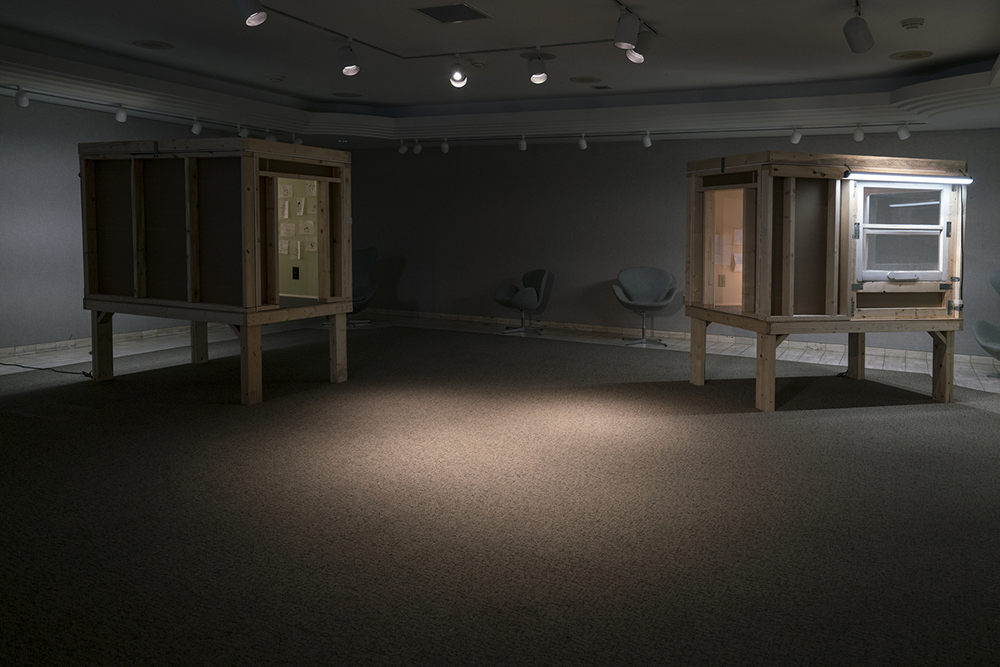
It can take a matter of seconds after you wake up from transplant surgery to know whether the transplant has worked: either you keep breathing, or your last breath leaves your body. This is the reality patients live with while they wait.
Bradley Necyk's ('14 MFA) current exhibition at the McMullen Gallery in the University of Alberta Hospital displays the thoughts, feelings and places of transplant patients while waiting for a transplant donor.
Necyk's work examines the mindset in accepting death. His approach to this project comes from over a year of research spent working with transplant patients and donor families. Necyk's Canadian Institutes of Health Research (CIHR)-funded research is part of his Master of Science degree in Psychiatry, which is supervised by Pamela Brett-MacLean and Andrew Greenshaw in the Department of Psychiatry at the U of A. Prior to this research, Necyk completed a Master of Fine Arts degree in Intermedia at the University of Alberta. His exhibition, entitled Retreat, enabled Necyk to break from his previous autobiographical art practice to communicate a patient/observer-based experience.
One particular work in the gallery, the sculpture Retreat II, displays poetry written by transplant patient Jimmy Bloom. Bloom's words are handwritten on sheets of lined paper and taped to the walls of the sculpture:
Madness can not break me down
smiles will never make me frown
happily into life I go
to friends and family this I'll show.
The sculpture itself is a surreal space; it's a mixture of comforting objects in a foreign environment. Placed close to Bloom's poetry are earphones, a lamp, a pillow and a few blankets. As you lean into the small, intimate space to read more of Bloom's poetry, you can hear the soft sound of music. Your body wants to feel comforted by the surroundings, but your mind reminds you that you're not at home.
Also in the gallery is the series of images entitled On Sunday. This features drawings by Necyk with text underneath the images. Sundays are traditionally a day of reflection and rest, and at the hospital, they are also the quietest day of the week. Within this series is the drawing, One of us will die first, which depicts a kiss. The figures' lips are gently touching, feeling the soft impact and slow movement from the shared caress. Defining the faces of the figures are pools of black ink that bleed into their lips, obscuring the separate bodies into one. These figures are still seeking life, still seeking connection with one another, even in the prospect of death. It's this feeling of resilience that links each of Necyk's pieces in his show.
Necyk's exhibition concludes a year-long program as the Friends of University Hospitals' Artist-in-Residence. This program, and the facilitation of Necyk's exhibition, is the handiwork of Tyler Sherard ('11 BFA), the Gallery & Collections Administrator at the McMullen Gallery.Also part of Necyk's residency program is the film Alberta, a collaboration between Necyk and Kyle Terrence (MFA Class of 2016), which is based on Necyk's interactions with donor families. The film screens on Tuesday, April 19 at the Metro Cinema
Don't miss the screening for Bradley Necyk's film, Alberta
Metro Cinema
Tuesday, April 19 at 7:30 p.m.
Bradley's exhibit, Retreat, will be in the McMullen Gallery at the University of Alberta Hospital until May 1, 2016
Julie-Ann Mercer is a Master of Arts candidate in the History of Art, Design & Visual Culture at the University of Alberta. Her SSHRC-funded research examines the visual construction of indigenous and settler-colonial relationships in 19th century print culture. In addition to her graduate research, Julie-Ann is an assistant on the SSHRC-funded research project, Object Lives and Global Histories in Northern North America, a gallery assistant at the Fine Arts Building Gallery and a freelance arts writer.